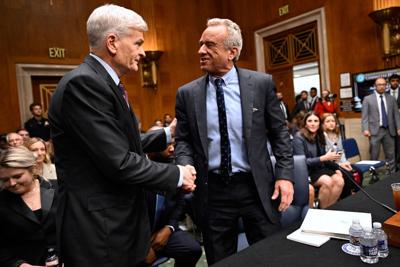WASHINGTON — U.S. Sen. Bill Cassidy is admonishing Health Secretary Robert F. Kennedy's decision to cancel about $500 million in vaccine research — one of his first public conflicts with Kennedy since helping him win confirmation to the job.
“It is unfortunate that the Secretary just canceled a half a billion worth of work, wasting the money which is already invested,” Cassidy wrote on X. “He has also conceded to China an important technology needed to combat cancer and infectious disease. President Trump wants to Make America Healthy Again and Make America Great Again. This works against both of President Trump’s goals.”
Cassidy then linked to a Forbes article about Kennedy’s decision not to fund further development of vaccine strains like the one used develop the inoculations that ended the COVID-19 pandemic. Cassidy joined a chorus of criticism by physicians and health care experts.
Kennedy’s Department of Health and Human Services office did not respond to a request for comment. Cassidy’s office said the senator wouldn't have further comment.
Kennedy’s “coordinated wind-down of its mRNA vaccine development activities” redirected about almost $500 million in development contracts with universities and private companies that are developing new vaccines. Messenger Ribonucleic acid, mRNA, vaccines make specific proteins that help immune systems to prevent or treat disease.
The most significant advance for mRNA medicines was stemming the COVID-19 pandemic — a vaccine created in record time, the speed of which amounted to a major victory in Trump's first term.
mRNA medicines fight diseases in a different way than traditional medicine. An mRNA vaccine can teach the body how to make a specific protein that can help your immune system prevent or treat certain diseases.
“As the pandemic showed us, mRNA vaccines don’t perform well against viruses that infect the upper respiratory tract,” Kennedy said is a post Tuesday on social media.
His decision Tuesday set off widespread protest among health officials, many of whom claim, given Kennedy's anti-vaccinations stances in the past, that this the health secretary's biggest move yet to undermine the nation's vaccination program. They argued that Kennedy provided no evidence to support his opinion on mRDA vaccines.
“mRNA is more than a vaccine technology — it’s a platform for modern medicine. It enables faster, more flexible responses to emerging health threats and is helping to transform treatment options across infectious diseases and oncology,” said a statement by Moderna Inc., a pharmaceutical research firm based in Cambridge, Massachusetts, that was one of the first to come up a COVID vaccine.
Moderna has 15 sites in Louisiana — mostly in Baton Rouge, New Orleans and their suburbs — contracted to conduct mRNA clinical trials for flu, RSV, and Norovirus treatments.
Cassidy in the past six months has questioned some of Kennedy’s policies and made suggestions. But he has seldom criticized an act so directly.
For instance in June, Cassidy wanted to wait to judge the replacements’ credentials when Kennedy fired the entire board of civilian scientists who advise Centers for Disease Control and Prevention on vaccines. And in late July, Cassidy opposed joining Democrats on the health community in their investigation of Kennedy’s actions.
Cassidy, more than any other senator, is responsible for the confirmation of Kennedy, a prominent vaccine skeptic. Several senators turned to Cassidy for his opinion as chair of the Senate Health Education Labor & Pensions committee and a physician for 30 years.
The Baton Rouge Republican endorsed Kennedy and mentions it often to underline a productive relationship with President Donald Trump.
Cassidy faces several opponents to his reelection who are claiming the incumbent is not conservative enough. Cassidy is one of the Republicans to vote to convict Trump of impeachment charges stemming from the Jan. 6 riot at the U.S. Capitol.


